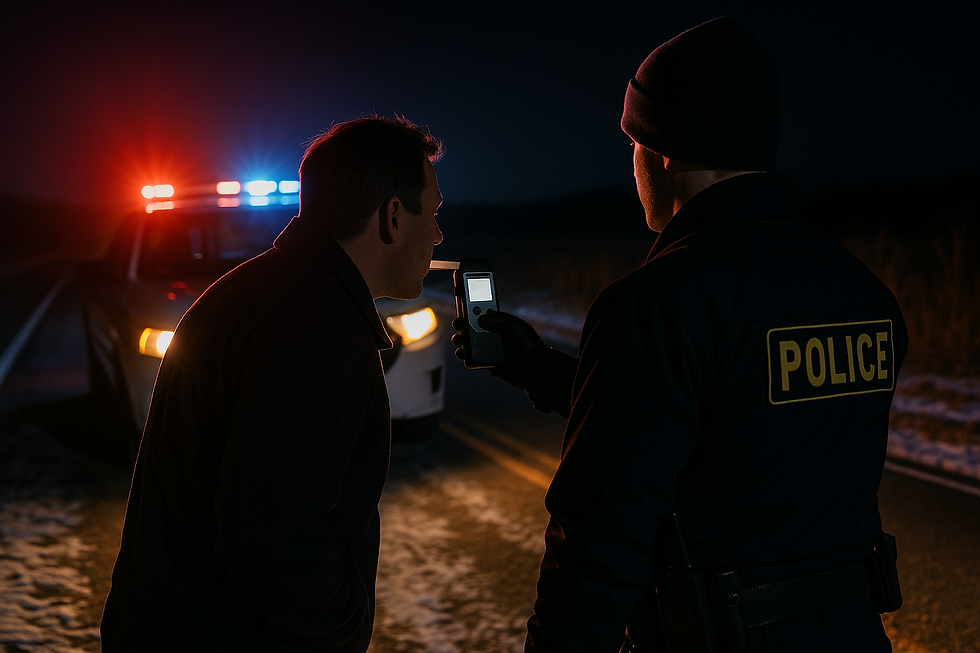What Are My Rights During a Police Search in North Dakota?
- Heartland

- Jul 29, 2025
- 4 min read

Whether you're pulled over on I-94, approached at your home, or questioned on a street in Minot, knowing your rights during a police search in North Dakota is critical. Understanding what law enforcement officers can—and can't—do can help you protect your rights and avoid self-incrimination.
In this blog, we’ll walk through the basics of search and seizure laws, what to do if you're approached by police, and how to respond if you believe your rights were violated.
Your Rights Under the Fourth Amendment
The U.S. Constitution’s Fourth Amendment protects individuals from “unreasonable searches and seizures.” In North Dakota, that protection is reinforced by state law and applies to your body, vehicle, home, and personal belongings.
In short, unless a legal exception applies, officers generally need a warrant to conduct a search. But there are several important exceptions, and that’s where things get tricky.
Common Types of Police Searches in North Dakota
1. Searches With a Warrant
A judge must issue a warrant based on probable cause.
Warrants must specify what is being searched and what officers are looking for.
You have the right to see the warrant if officers show up at your door.
Example: Officers in Bismarck present a search warrant for your apartment, looking for evidence of drug distribution. They are only allowed to search areas related to that investigation—not your entire building or unrelated belongings.
2. Consent Searches
If you voluntarily say “yes” to a search, officers don’t need a warrant or probable cause.
You have the right to say no. Politely declining a search cannot be used against you in court.
Consent must be given freely and clearly—not under pressure or intimidation.
Tip: If you're asked, “Do you mind if I take a look in your car?” you can legally say, “I do not consent to a search.”
3. Searches of Vehicles
Under North Dakota law and federal law, police can search your vehicle without a warrant if:
They have probable cause to believe it contains evidence of a crime.
They conduct an inventory search after your car is impounded.
You give consent.
However, a routine traffic stop does not automatically justify a search.
Scenario: You're pulled over in Williston for speeding. Unless officers smell drugs, see a weapon, or observe something illegal in plain view, they can't search your car without consent or probable cause.
4. Searches of Your Person (Body)
Police may pat you down if they reasonably believe you’re armed and dangerous (called a “Terry stop”).
But full searches of your body (e.g., pockets, bags) generally require:
Your consent,
A search warrant, or
Probable cause with specific circumstances (e.g., arrest).
5. Searches at Your Home
Your home receives the highest level of constitutional protection. In most cases, police cannot enter without:
A valid search warrant, or
Consent from someone with authority over the property.
There are exceptions in emergency situations, like:
To prevent destruction of evidence,
To respond to danger, or
If someone is in immediate harm.
What Should You Do During a Police Search?

If you find yourself in a police search situation in North Dakota, follow these key tips:
Stay calm and respectful.
Ask if you're being detained or if you're free to leave.
Do not resist physically—even if the search seems illegal.
State clearly that you do not consent to the search.
Ask to speak to an attorney before answering any questions.
Saying “I don’t consent to a search” protects your rights—even if officers go ahead with the search anyway.
Can Illegally Obtained Evidence Be Used Against You?
No. If police conduct an illegal search, your defense attorney can file a motion to suppress evidence. This means that anything found during an unlawful search—such as drugs, weapons, or statements—could be ruled inadmissible in court.
This protection is critical in cases involving drug possession, stolen property, or other search-related crimes in North Dakota.
Common Questions About Police Searches in ND:
Can I record the police during a search?
Yes, as long as you’re not interfering. North Dakota law allows recording public officials in public spaces.
Do I have to unlock my phone?
Not without a warrant. Courts are still divided on this, but in most cases, you are not required to give up your password or biometric data without a valid warrant.
What if I gave consent under pressure?
A good defense attorney can argue that your consent wasn’t voluntary. The court will lo
ok at the total circumstances—including whether officers threatened or coerced you.
Final Thoughts: Know Your Rights, Protect Yourself
Navigating a police search in North Dakota can be stressful, but understanding your rights empowers you to stay calm and in control. Whether you're in Minot, Bismarck, Dickinson, or a small town like Rugby or Stanley, the law applies statewide.
If you believe your rights were violated during a police search, don’t wait to get help. At Heartland Law Office, we know how to challenge illegal searches and fight for your constitutional rights.
Related Reading:
Need Help After a Police Search?
If you’ve been searched or charged with a crime in North Dakota, contact Heartland Law Office today. Attorney Patrick Waters has nearly 20 years of experience defending clients across the state.
Call 701-JUSTICE or Schedule a consultation
This article is for informational purposes only and does not constitute legal advice. Always consult with a licensed attorney regarding your specific situation.





